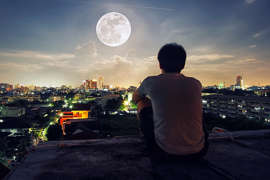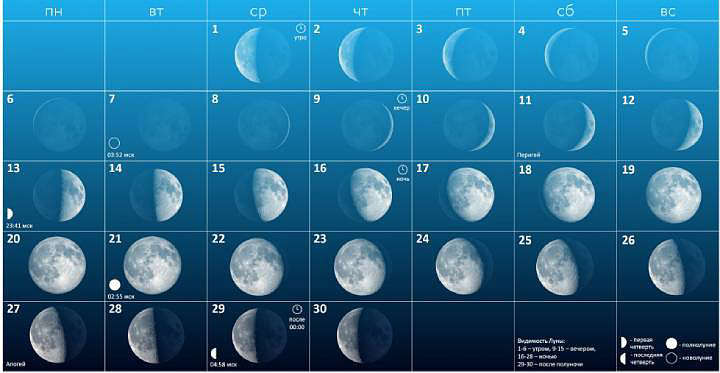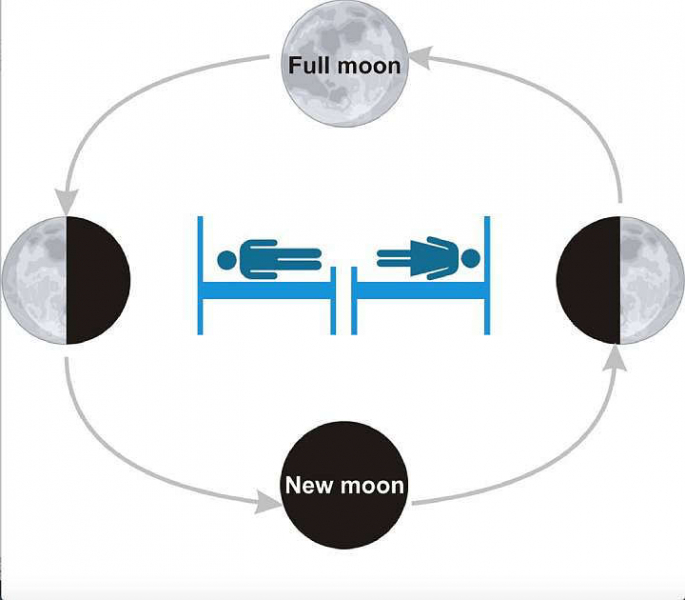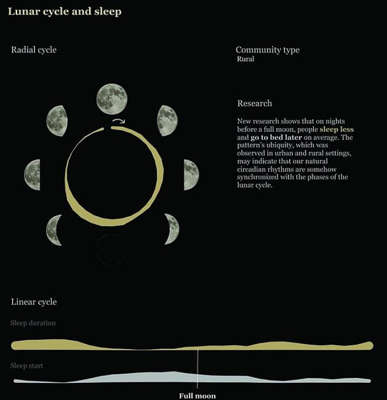
If you believe your eyes and the Moscow Planetarium, the Moon, which began to grow on September 9, 2021, looked almost full by September 19. It will become completely complete on September 21 and will continue to visually remain so until September 23 inclusive. And then it will start to decrease. By the end of September, only half of the moon will remain.
Remember how you slept on moonlit nights? Should be worse than usual.
The fact that the moon interferes with sleep was convinced by Swedish scientists from Uppsala University. As reported in the journal Science of the Total Environment, it is referred to in a press release from the university and on the ScienceAlert portal, which briefly introduced the results.

The Swedes were by no means the first to become interested in the moon – in terms of its influence on the duration and quality of sleep. But their research, as they themselves assure, has become the most ambitious and supposedly the most reliable. Scientists recruited 492 women and 360 men. The volunteers were given polysomnography – recording various parameters of their sleep using numerous sensors and a computer.
Recorded at night – for several years – in the process of how the moon was waning, then waking up, including the new moon and full moon. That is, they covered the entire lunar cycle with a duration of 29.5 days. This is how much time passes from one new moon to the next. Or between two full moons.
As a result, the Swedes, led by Christian Benedict, Associate Professor at Uppsala University's Department of Neuroscience, have collected extensive data on how and how much men and women slept on moonless and moonless nights. Subsequent analysis allowed the Moon to be caught in the fact that it really affects people.

It turned out that during the growing moon, sleep is disturbed, both in men and women. Becomes a little more restless. Both those and others wake up more often, toss and turn more. They calm down under the waning moon.
However, in men, the reaction is stronger. On the waxing moon, the duration of their sleep is reduced by an average of 20 minutes. It also decreases in women, but much less – by only 12 minutes on average.
The nature of the “lunar phenomenon” remains mysterious. An obvious, seemingly, explanation, they say, moonlight prevents people from sleeping, it seems that it did not withstand scientific testing. Scientists from several universities – Washington (University of Washington), Argentine National (Universidad Nacional de Quilmes) and Yale (Yale University) checked. As reported in the journal Science Advances.
The experiments, led by Leandro Casiraghi, involved Argentinean Indians of the Toba tribe and students from Seattle. Indians close to nature were guided mainly by natural light – the light of the moon could really interfere with them. Urban students, accustomed to electric lighting, did not see the moon at night. However, as the moon approached the full moon, the duration of sleep decreased for both. The Indians, however, have a little more than the city dwellers. Scientists did not take sex differences into account.

The results obtained on the American continent showed that on the full moon, people slept an hour less on average, and went to bed half an hour later. Which confirmed the existence of the phenomenon.

Both the Americans and the Swedes believe – so far speculatively: the point here is in a kind of memory of their ancestors, whom evolution forced to stay awake longer on those nights when the bright – full – moon was shining. Natural light added time that could be used for useful activities.
By the way, farmers still use the light of the full moon – they plow, sow, harvest, saving energy.
The full moon is admired – especially by lovers, who are “insomnia” provoked by her, only on hand, as they say. Promotes the development of romantic feelings and, as a result, an increase in fertility.
Researchers at Uppsala University are cautious about another hypothesis. According to her, people, even without seeing the moon, somehow feel its gravitational effect. It – albeit insignificantly, but changes during the lunar cycle. Some geomagnetic effects are not excluded. Which requires further study.

In the meantime, scientists admit that the current study was “observational.” And the goal was not to grasp the essence.
AT THIS TIME
Unclean power sleeps peacefully
The mystics stubbornly believe that as the full moon approaches, and even more so during it, evil spirits begin to rage: werewolves, ghouls rage, the revived dead crawl out of the graves, and the magic rituals of sorcerers become especially effective.

Many believe that the full moon turns mentally unstable people into sleepwalkers. Allegedly, under its influence, they often go crazy, commit suicide. And they just get sick.
Scientists have tested it many times: mystical beliefs are complete nonsense. Psychologists James Rotton, Ivan Kelly and astronomer Roger Culver analyzed dozens of studies on the effect of the full moon on the psyche. Didn't find anything convincing. And they even wrote a book “The moon was full, but nothing happened.”
Statistics show that even dogs, contrary to popular belief, do not become more aggressive. On a full moon, they bite people with the same frequency as without it.
Mikhail Bulgakov was of a different opinion, who wrote the following in the novel The Master and Margarita:
“… He cannot cope with this spring full moon. As soon as it begins to approach … Ivan Nikolaevich becomes restless, nervous, loses his appetite and sleep, waits until the moon is ripe … “
BY THE WAY
Weird coincidence
Confused by the official statistics of COVID-19 infection in Russia, it shows: from September 14 to September 19, the number of people infected was growing. At this time, the Moon also grew – from half to whole. Suddenly somehow contributed?

